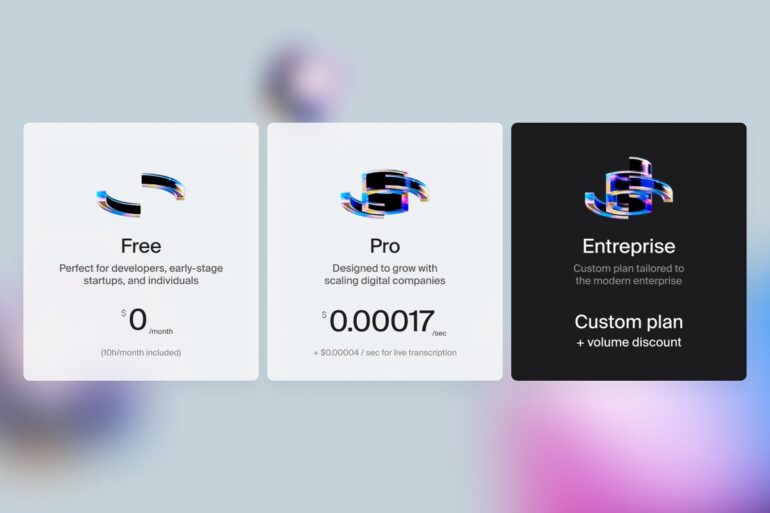TL;DR:
- French AI startup Gladia is revolutionizing audio data interaction with its advanced transcription API.
- Existing speech-to-text APIs from major cloud providers have limitations in terms of cost, reliability, and speed.
- Gladia’s API, built on OpenAI’s Whisper, offers improved performance and addresses common issues.
- The API provides affordable transcription, detecting multiple speakers, timestamps, language detection, and punctuation.
- Gladia’s API delivers faster transcriptions at a fraction of the cost, surpassing other transcription solutions.
- The company plans to expand its offerings, including translation, content summarization, categorization, sentiment analysis, and more.
- Gladia secured a $4 million seed funding round led by New Wave, with prominent investors backing its vision.
Main AI News:
In today’s fast-paced business landscape, efficient and accurate audio transcription is a vital need for companies across various industries. French AI startup Gladia is disrupting the market with its groundbreaking audio transcription application programming interface (API), poised to outperform existing solutions. This innovative technology foundation not only enhances transcription capabilities but also unlocks a plethora of new use cases for audio data.
While major cloud providers like Google, Amazon, and Microsoft offer their own speech-to-text APIs, they come with limitations. These existing APIs often prove to be expensive, sluggish, and lacking in advanced features. Gladia’s co-founder and CEO, Jean-Louis Quéguiner, formerly the head of AI at OVHcloud, alongside Jonathan Soto, identified these pain points and set out to address them head-on.
The primary drawback of existing APIs lies in their pricing structure. Transcribing audio for an hour can cost between $1.50 and $2, putting a strain on companies’ budgets. Additionally, output reliability poses another challenge, with certain languages performing well while others receive minimal support. Moreover, when multiple languages are spoken, most APIs fail to recognize language changes and provide accurate transcriptions in more than one language. Lastly, the speed of transcription APIs leaves much to be desired, often taking over 15 minutes to transcribe an hour of audio. This delay hinders industries requiring immediate access to transcriptions.
Gladia’s solution is built upon Whisper, OpenAI’s renowned open-source transcription model. Rather than reinventing the wheel, Gladia leveraged Whisper’s capabilities, making significant advancements based on customer feedback. The team dedicated extensive effort to transforming Whisper into a fast and responsive transcription model. Furthermore, they diligently addressed Whisper’s tendency to generate inaccurate information, a common issue among language models. To rectify this, Gladia trained Whisper on closed captions sourced from popular online platforms like YouTube. By eliminating the overrepresentation of certain sentences and enhancing Whisper’s capabilities, Gladia offers a more reliable transcription solution.
In addition to modifications made to Whisper and its implementation, Gladia has developed pre-processing and post-processing algorithms that significantly improve the quality of transcriptions. These algorithms fine-tune the output, resulting in an impressive end product.
One of the standout advantages of Gladia’s API is its affordability, with the ability to transcribe an hour of audio for just $0.61. Moreover, the transcription process itself takes approximately 60 seconds, making it significantly faster than alternatives. The API boasts multiple features, including the ability to detect multiple speakers, add timestamps, detect languages, and seamlessly switch between them if required. Gladia also takes care of punctuation and casing automatically. While the end result is provided in JSON format like most APIs, Gladia goes a step further by supporting SRT and VTT files, enabling companies to generate subtitles effortlessly.
To put Gladia’s claims to the test, I created an account and uploaded an audio recording of an interview. The experience exceeded my expectations, with Gladia delivering accurate transcriptions in less time than both Google and Azure’s speech-to-text APIs. Although the results were not flawless, Gladia showcased an impressive understanding of acronyms and technical terms. In a parallel test, I ran the same audio file through Aiko, a local Mac app that utilizes Whisper for transcription. While Aiko performed admirably, Gladia’s speed outshined it by a significant margin, firmly establishing Gladia as the best transcription API I have ever used.
Nevertheless, Gladia’s vision extends beyond providing a top-notch transcription API. Building on this robust technical foundation, the company aims to introduce additional features and expand its offerings. For example, once an audio file has been transcribed, Gladia can seamlessly translate the text into various languages. Combined with word-level timestamps, this functionality allows companies to upload an audio file and obtain subtitles in dozens of languages within minutes.
Looking forward, Gladia envisions a future where it not only summarizes the content of audio files but also categorizes them into multiple topics, automatically creates chapters, conducts sentiment analysis, and more. By transitioning from two-dimensional to three-dimensional data, Gladia seeks to augment audio with intelligence, creating a truly transformative experience. While transcription may become commoditized over time, Gladia’s focus lies in the additional options and value it can offer.
Gladia’s remarkable achievements have not gone unnoticed. In a recent seed funding round, the company raised an impressive $4 million, with New Wave leading the charge. Other notable investors include Sequoia, Cocoa, and prominent business angels such as Solomon Hykes, Pierre Betouin, Miroslaw Klaba, and Alexandre Berriche.
Conclusion:
Gladia’s disruptive API is poised to reshape the audio data market. By addressing the limitations of existing solutions, Gladia offers an affordable and efficient transcription service with advanced features. Its utilization of OpenAI’s Whisper model, combined with proprietary algorithms, results in faster and more accurate transcriptions. With a clear roadmap for future enhancements, including translation and content analysis, Gladia is well-positioned to become a dominant player in the audio intelligence space. The substantial seed funding and notable investor support further validate the company’s potential for significant market impact.

